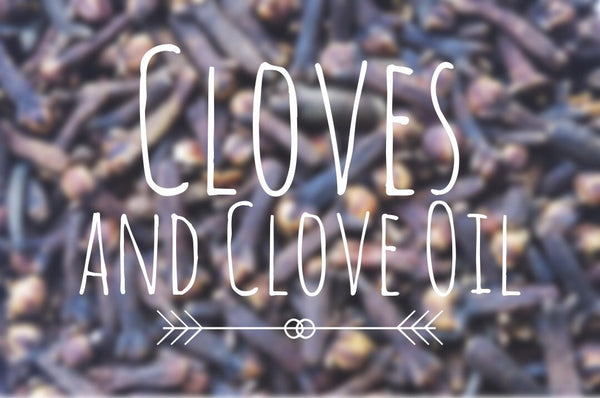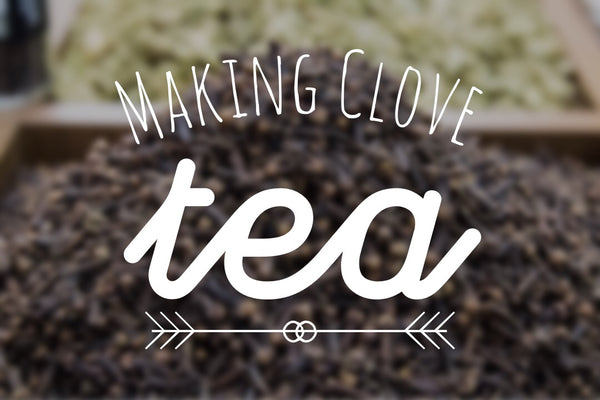Clove is a warming spice with a distinctive taste often associated with winter drinks and Christmas treats. It has unique properties that has seen it increase in popularity as a health drink, with clove tea being one of the best ways to consume it. In this guide, we’ll look at some of the ways this soothing spice may benefit your health, as well as the best ways to consume it.

Health Benefits of Cloves
Cloves contain organic compounds that may provide a number of health benefits when consumed whole, crushed, or in a hot drink infusion. There are also some notable benefits of clove oil, as discussed below.
1. It Contains Many Antioxidants
Cloves contain several antioxidants, including something known as eugenol, which has shown a lot of promise in recent studies and is the main reason clove oil is such a potent weapon in the fight against dental pain (more on that below). Eugenol can also be found in nutmeg and mace, but it is at its highest concentration in cloves.
These antioxidants can help fight oxidative stress and inflammation throughout the body, which can significantly improve your health and reduce your risk of disease.
2. It Can Fight Cancer Cell Growth
Clove oil has been studied for its potential anti-cancer effects, and under laboratory conditions, it has proven to be effective at killing certain forms of this chronic disease.(1) It takes a lot to go from test tubes and highly concentrated clove extracts to proving that this spice can have an effect on cancer in the body, but if nothing else, it’s proof that clove possesses some very strong and potentially very useful compounds.
3. Clove Oil for Toothache

As with many of the herbs and spices we have covered previously on Shelgo Tea (including rosemary oil), clove is often turned into an essential oil and then used as a food additive. It also has medical uses and is particularly popular for the treatment of dental pain. A little splash of clove oil applied directly to the problematic tooth can work wonders, killing the pain instantly and providing some much-needed relief.
It contains an anesthetic compound known as eugenol. Not only can this reduce pain on contact, but it may also help reduce inflammation.(2) Typically, the pain relief is short-lived so it’s not a long-term solution, but it can keep you from pulling your hair out before you get to the dentist.
4. It Could Kill Bacteria
We have written about a few strong spices and herbs that can be used to fight stomach infections and common bacteria—including chilli peppers—and clove is another one. The same compound that can fight inflammation and pain, eugenol, can also help to kill bacteria like E.coli and may help improve digestive health.
As with the anti-cancer studies mentioned above, many of the research surrounding these benefits was conducted in test tubes under lab conditions, but it means that clove oil and cloves in general could be used as a natural preservative and may also provide some of the same benefits in or on the body.
5. It Contains Several Nutrients

A lot of herbs and spices are filled with phytonutrients but are all but devoid of vitamins and minerals. Cloves have a little more substance to them, though. A single crushed tablespoon contains around:
- Manganese = 100%
- Vitamin K = 13%
- Vitamin C = 10%
- Calcium = 5%
- Magnesium = 5%
- Vitamin E = 4%
6. It Can Reduce Inflammation
The potent antioxidant properties of eugenol and other compounds in clove can have a significant anti-inflammatory effect on the body. Not only can this aid in the treatment of dental pain and reduce the risk of chronic disease, but it could also improve liver health and brain health, as many serious conditions stem from chronic inflammation.
Several animal studies have been conducted on clove’s healing properties, including a 2014 study that suggested it could be used to reverse some forms of liver damage, and there have also been a few promising human studies, although none of these have been extensive and they are also a little outdated, with the most commonly cited study (on the benefits of eugenol supplementation for liver health) being nearly 25 years old.(3)
Dangers of Clove Oil
You shouldn’t have any issues consuming culinary doses of cloves. However, you may experience some side effects if you consume clove oil, which is a highly concentrated form and is incredibly potent. We previously discussed a case where someone died from consuming concentrated lemongrass oil, even though lemongrass itself is widely tolerated and perfectly safe, and it’s a similar story with clove oil.
A study from 2005 reported on a 15-month-old child who developed “fulminant hepatic failure” (sudden liver failure) after ingesting just 10ml of clove oil.(4) Thankfully, the child survived, but not without issue, and this is not an isolated case.
Clove oil needs to be handled with care. It’s not something you should consume, nor is it something you should use freely. It does have its uses and is one of the best natural substances to kill dental pain, but don’t assume that it’s safe just because it’s natural, and make sure it’s out of reach of children at all times.
How to Make Clove Tea

Clove tea is easy to make and tastes great on its own and with other spices. You can add a touch of warming anise or some crushed fennel seeds to complement the flavour of the clove, but black tea also works really well.
Cloves are often used in Masala Chai along with ginger, cardamom pods, and a base of Indian black tea. They are strong, so you don’t need a lot of them, just a couple crushed pieces will do.
We find that the best way to use cloves is to add a few whole pieces to a couple cups of water, bring to the boil in a pan, and then add 1 tsp of strong black tea, 2 tsp of honey, 1 tsp of cardamom and, if you have one, a cinnamon stick. After simmering for a few minutes, turn off the heat, add a splash of whole milk or condensed milk, and enjoy.
You can add turmeric, ginger, and other spices, as well—you really can’t go wrong with spiced tea.

